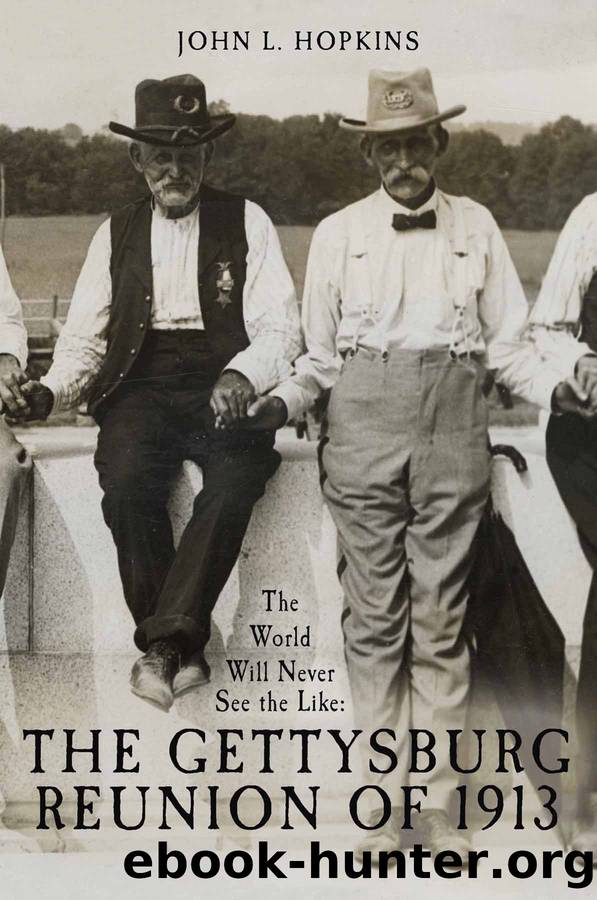The World Will Never See the Like by John L. Hopkins

Author:John L. Hopkins [Hopkins, John L.]
Language: eng
Format: epub
Tags: History / United States / Civil War Period (1850-1877)
Publisher: Savas Beatie
Published: 2023-11-06T04:00:00+00:00
âWhen Longstreet joined the Republicans instead of rallying to the Lost Cause,â Piston notes, âhe exposed not only his present motives but his Confederate past to attack.â12
So long as Lee was alive, criticism of Longstreet focused on those present motives. But after Leeâs death in October 1870, partisans of the Lost Cause, led by Jubal Early, began to develop a new line of attack. In a speech at the newly renamed Washington and Lee College in January, 1872, Early claimed that on the night of July 1, 1863, Lee had said that he intended Longstreetâs Corps to attack the Federals at dawn the next day. Had Longstreet done as their chief desired, Early declared, rather than delaying his assault until late afternoon, Gettysburg would have been the decisive Confederate victory that secured Southern independence.
Longstreet did not respond publicly to the first appearance of this patent fabrication, nor for years thereafter, as Early and allies such as the Reverend William N. Pendleton, Leeâs former chief of artillery, who had good reason to deflect attention from his own performance at Gettysburg, continued to insist that Longstreet had bungled Leeâs plan for a dawn attack on July 2. But as Piston observes, âEarlyâs words took on great power and the ring of authority because he told Southerners exactly what they wanted to hear. His version of Gettysburg, which blamed Longstreet, provided an explanation for the Confederacyâs defeat which neither entailed the loss of Godâs Grace nor questioned the superiority of Southern civilization. He chose as his scapegoat a man already intensely unpopular, who was not identified with any one state and who could therefore be attacked without insulting the memory of soldiers from any part of the South.â13
By the late 1870s, however, Longstreet could stand no more. He published a pair of articles in McClureâs, later reprinted in The Annals of the War Written by Leading Participants North and South, in which he quoted extensively from letters of members of Leeâs staff to thoroughly demolish the myth of the intended dawn attack. Had he stopped there, he might have done much to repair the damage to his wartime reputation, but he went on to offer a critique of his commanderâs performance at Gettysburg. âThere is no doubt,â Longstreet wrote, âthat General Lee, during the crisis of that campaign, lost the matchless equipoise that usually characterized him, and that whatever mistakes were made were not so much matters of deliberate judgment as the impulses of a great mind disturbed by unparalleled conditions.â Far from putting the controversy to rest, Longstreetâs articles ignited a new wave of vituperative responses from Early, Pendleton, and others, much of it in the pages of the Southern Historical Society Papers. Longstreet fired back. During a trip to Antietam in 1893, he gave a long interview to Leslie J. Perry, a Union veteran and one of the compilers of The War of the Rebellion: Official Records of the Union and Confederate Armies, which ran in The Washington Post. In it,
Download
This site does not store any files on its server. We only index and link to content provided by other sites. Please contact the content providers to delete copyright contents if any and email us, we'll remove relevant links or contents immediately.
In Cold Blood by Truman Capote(3374)
The Innovators: How a Group of Hackers, Geniuses, and Geeks Created the Digital Revolution by Walter Isaacson(3141)
Steve Jobs by Walter Isaacson(2889)
All the President's Men by Carl Bernstein & Bob Woodward(2362)
Lonely Planet New York City by Lonely Planet(2215)
And the Band Played On by Randy Shilts(2197)
The Room Where It Happened by John Bolton;(2150)
The Poisoner's Handbook by Deborah Blum(2131)
The Innovators by Walter Isaacson(2096)
The Murder of Marilyn Monroe by Jay Margolis(2094)
Lincoln by David Herbert Donald(1981)
A Colony in a Nation by Chris Hayes(1926)
Being George Washington by Beck Glenn(1906)
Under the Banner of Heaven: A Story of Violent Faith by Jon Krakauer(1788)
Amelia Earhart by Doris L. Rich(1686)
The Unsettlers by Mark Sundeen(1682)
Dirt by Bill Buford(1669)
Birdmen by Lawrence Goldstone(1661)
Zeitoun by Dave Eggers(1643)
